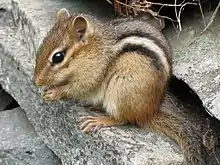Tamias
Tamias is a genus of chipmunks within the tribe Marmotini of the squirrel family. It includes a single living species, the Eastern chipmunk (Tamias striatus)[1] The genus name Tamias (Greek: ταμίας) means "treasurer", "steward", or "housekeeper",[2] which is a reference to the animals' role in plant dispersal through their habit of collecting and storing food for winter use.[3]
| Tamias | |
|---|---|
 | |
| Eastern chipmunk (Tamias striatus) | |
| Scientific classification | |
| Kingdom: | Animalia |
| Phylum: | Chordata |
| Class: | Mammalia |
| Order: | Rodentia |
| Family: | Sciuridae |
| Tribe: | Marmotini |
| Genus: | Tamias Illiger, 1811 |
| Species | |
|
See text. | |
The genus Tamias may include all chipmunk species in three genera: Tamias, the eastern chipmunk and other fossil species; Eutamias, of which the Siberian chipmunk (E. sibiricus) is the only living member; and Neotamias, which includes the 23 remaining, mostly western, species. These classifications are arbitrary, and most taxonomies over the twentieth century have placed the chipmunks in a single genus. However, studies of mitochondrial DNA show that the divergence between each of the three chipmunk groups is comparable to the genetic dissimilarity between Marmota and Spermophilus.,[4][5][6][7] so each of the three genera have been split.
In addition to the Eastern chipmunk, some fossil species from Eurasia have been assigned to this genus:
- Tamias aristus (Ray, 1965) – late Pleistocene
- Tamias allobrogensis Mein and Ginsburg, 2002 – Miocene of France[8]
- Tamias atsali De Bruijn, 1995 – Pliocene of Greece[9]
- Tamias eviensis De Bruijn et al., 1980 – Miocene of Greece[10]
Tamias urialis Munthe, 1980, described from the Miocene of Pakistan, may be more closely related to Tamiops.[11]
References
- Musser et al., 2010, p. 22
- Henry George Liddell; Robert Scott. (1940). A Greek-English Lexicon, revised and augmented throughout by Sir Henry Stuart Jones with the assistance of Roderick McKenzie. Oxford: Clarendon Press.
- Snyder, D.P. (1982). "Tamias striatus". Mammalian Species (168): 1–8. doi:10.2307/3503819. JSTOR 3503819.
- Wilson, D. E.; D. M. Reeder (2005). "Mammal Species of the World". Archived from the original on 2007-06-23. Retrieved 2007-06-27.
- Piaggio, A. J.; Spicer, G. S. (2001). "Molecular phylogeny of the chipmunks inferred from mitochondrial cytochrome b and cytochrome oxidase II gene sequences" (PDF). Molecular Phylogenetics and Evolution. 20 (3): 335–350. doi:10.1006/mpev.2001.0975. PMID 11527462.
- Piaggio, Antoinette J.; Spicer, Greg S. (2000). "Molecular Phylogeny of the Chipmunk Genus Tamias Based on the Mitochondrial Cytochrome Oxidase Subunit II Gene" (PDF). Journal of Mammalian Evolution. 7 (3): 147–166. doi:10.1023/a:1009484302799.
- Musser, G. G.; Durden, L. A.; Holden, M. E.; Light, J. E. (2010). "Systematic review of endemic Sulawesi squirrels (Rodentia, Sciuridae), with descriptions of new species of associated sucking lice (Insecta, Anoplura), and phylogenetic and zoogeographic assessments of sciurid lice". Bulletin of the American Museum of Natural History. 339 (339): 1–260. doi:10.1206/695.1. hdl:2246/6067.
- Mein and Ginsburg, 2002
- De Bruijn, 1995
- Doukas, 2003, table 2
- Qiu et al., 2008, p. 115